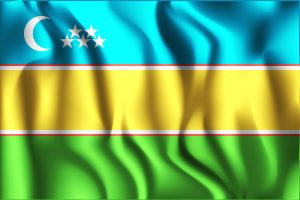A fourth Karakalpak has been released from detention in Kazakhstan, a year after her arrest ostensibly at the request of Uzbek authorities. The releases mark a stalemate of sorts. Kazakhstan’s government was under pressure to not deport Karakalpak activists to Uzbekistan, where they would likely face lengthy prison sentences.
Ziuar Mirmanbetova was released on October 4, with videos showing her leaving a pre-trial detention center in Almaty to the warm reception of relatives. She had been detained in October 2022. In September, Koshkarbai Toremuratov and Zhangeldi Dzhaksymbetov were released, followed by Raisa Kudaibergenova – all three had been detained in September 2022.
Tleubike Yuldasheva, another member of the Karakalpak diaspora in Kazakhstan, was detained in Aktobe in November 2022. Her detention is set to expire on November 13.
As RFE/RL noted, “Kazakh law does not allow individuals awaiting extradition to be held for more than one year.”
The releases mark a respite, but the extradition requests likely remain active. The five were reportedly accused by Uzbek authorities of encroaching on the constitutional order of Uzbekistan and producing, distributing, and demonstrating materials containing a threat to public security and public order.
In August, requests for asylum in Kazakhstan by Toremuratov and Dzhaksymbetov were denied. The two men are reportedly appealing to Kazakhstan’s Supreme Court, a process that could take another year.
But if cases mired in similarly thorny transnational issues – such as Uyghurs seeking safety outside of China or Russians escaping Moscow’s grasp – are anything to go by, there is little likelihood of successfully obtaining asylum in Kazakhstan, even if Astana decides not to extradite.
Kazakhstan-based Karakalpak activist Aqylbek Muratbai told RFE/RL in September, after the releases of Toremuratov and Dzhaksymbetov, that “Uzbekistan’s extradition request remains valid…. We hope that [Toremuratov and Dzhaksymbetov] will be allowed to leave Kazakhstan for a third country.”
In June 2022, Tashkent had released a first draft of proposed constitutional changes, which dropped provisions guaranteeing Karakalpakstan the right to secede — previously enshrined in Article 74, situated in a chapter dedicated entirely to Karakalpakstan’s unique status. Following massive protests, and a violent crackdown in early July in Nukus, Uzbek President Shavkat Mirziyoyev shelved the offending changes (while still pursuing a constitutional referendum that was ultimately held in May 2023) but at the same time the state went after Karakalpak activists within Karakalpakstan and abroad.
Although the Uzbek Constitution, even after its latest update, preserves the technical right of people in Karakalpakstan to hold a secession vote, it’s abundantly clear that calling for such a vote is perceived as separatism, a clear threat to the stability of the state. (In the new constitution, that right is outlined in Article 89, with articles 85-90 pertaining to Karakalpakstan.)
To date, 61 Karakalpaks have been tried, convicted, and sentenced in Uzbek courts on charges related to the July 2022 unrest — 22 in January and another 39 in March. Karakalpak lawyer and journalist Dauletmurat Tazhimuratov has been handed the harshest sentence so far, 16 years. His sentence was upheld on appeal, while others saw their sentences either reduced or changed to house arrest.
In February Uzbek authorities said three members of law enforcement had been detained on unspecified charges, presumably related to the violence in Nukus, and in August they were sentenced. Tried quietly and referred to only by their initials (unlike the Karakalpaks put on trial in public, their names and faces plastered across the media), two of the officers were given seven-year sentences, followed by two-year bans on working in law enforcement, having been charged with torture. The other officer was charged with perjury and “failing to come to the rescue.” He was given a three-year sentence, plus a one-year ban on working in law enforcement.
According to Uzbek authorities, 21 people died in during the protests in July 2022, four of them law enforcement. The Austria-based Freedom for Eurasia human rights group published a report earlier this year claiming that at least 70 people were killed during the unrest.
While the releases in Kazakhstan have been welcomed by the Karakalpak community, it’s clear that a sense of unease remains. There remains little room in Uzbekistan to hold an open dialogue about Karakalpakstan’s status and the hopes of the region’s people.































